Unit 12: Organisational Behaviour Report: Waitrose Case Study Analysis
VerifiedAdded on 2023/01/13
|17
|5873
|33
Report
AI Summary
This report examines the organisational behaviour of Waitrose, a UK supermarket chain, focusing on how culture, power, and politics influence individual and team behaviour. The analysis includes an exploration of Waitrose's organisational culture using Handy's cultural model and an examination of organisational power through the French and Raven model, highlighting the impact of legitimate, coercive, reward, and expert power. The report further delves into motivation theories, specifically content theories like Maslow's hierarchy of needs and Herzberg's two-factor theory, to understand how Waitrose motivates its employees. The report also discusses the elements of effective and ineffective teams, including the application of relevant team development theories. Finally, the report evaluates the concepts and philosophies of organisational behaviour, providing a comprehensive overview of how Waitrose manages its workforce and achieves its goals. The report is based on a student assignment from Kensington College of Business.
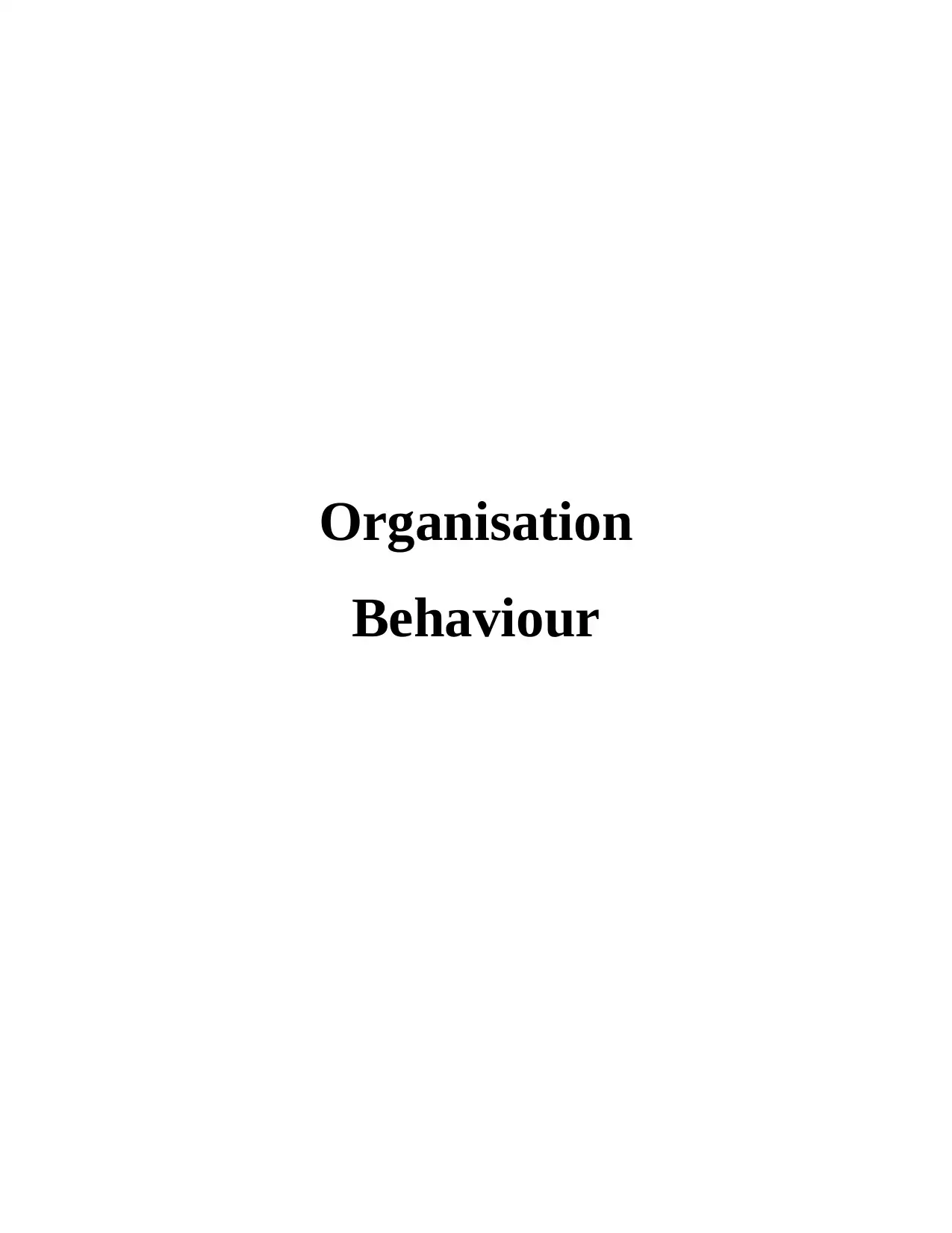
Organisation
Behaviour
Behaviour
Paraphrase This Document
Need a fresh take? Get an instant paraphrase of this document with our AI Paraphraser
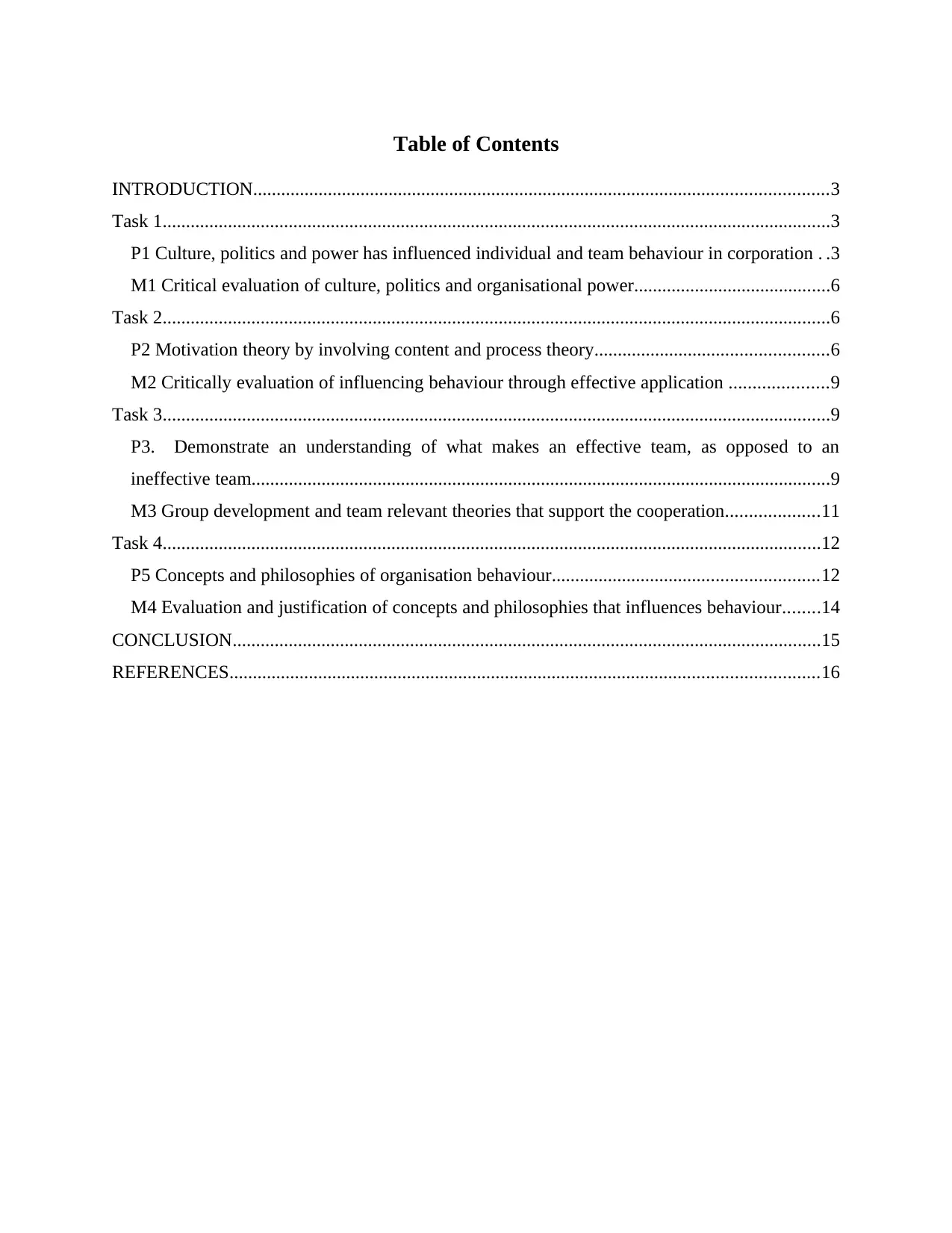
Table of Contents
INTRODUCTION...........................................................................................................................3
Task 1...............................................................................................................................................3
P1 Culture, politics and power has influenced individual and team behaviour in corporation . .3
M1 Critical evaluation of culture, politics and organisational power..........................................6
Task 2...............................................................................................................................................6
P2 Motivation theory by involving content and process theory..................................................6
M2 Critically evaluation of influencing behaviour through effective application .....................9
Task 3...............................................................................................................................................9
P3. Demonstrate an understanding of what makes an effective team, as opposed to an
ineffective team............................................................................................................................9
M3 Group development and team relevant theories that support the cooperation....................11
Task 4.............................................................................................................................................12
P5 Concepts and philosophies of organisation behaviour.........................................................12
M4 Evaluation and justification of concepts and philosophies that influences behaviour........14
CONCLUSION..............................................................................................................................15
REFERENCES..............................................................................................................................16
INTRODUCTION...........................................................................................................................3
Task 1...............................................................................................................................................3
P1 Culture, politics and power has influenced individual and team behaviour in corporation . .3
M1 Critical evaluation of culture, politics and organisational power..........................................6
Task 2...............................................................................................................................................6
P2 Motivation theory by involving content and process theory..................................................6
M2 Critically evaluation of influencing behaviour through effective application .....................9
Task 3...............................................................................................................................................9
P3. Demonstrate an understanding of what makes an effective team, as opposed to an
ineffective team............................................................................................................................9
M3 Group development and team relevant theories that support the cooperation....................11
Task 4.............................................................................................................................................12
P5 Concepts and philosophies of organisation behaviour.........................................................12
M4 Evaluation and justification of concepts and philosophies that influences behaviour........14
CONCLUSION..............................................................................................................................15
REFERENCES..............................................................................................................................16
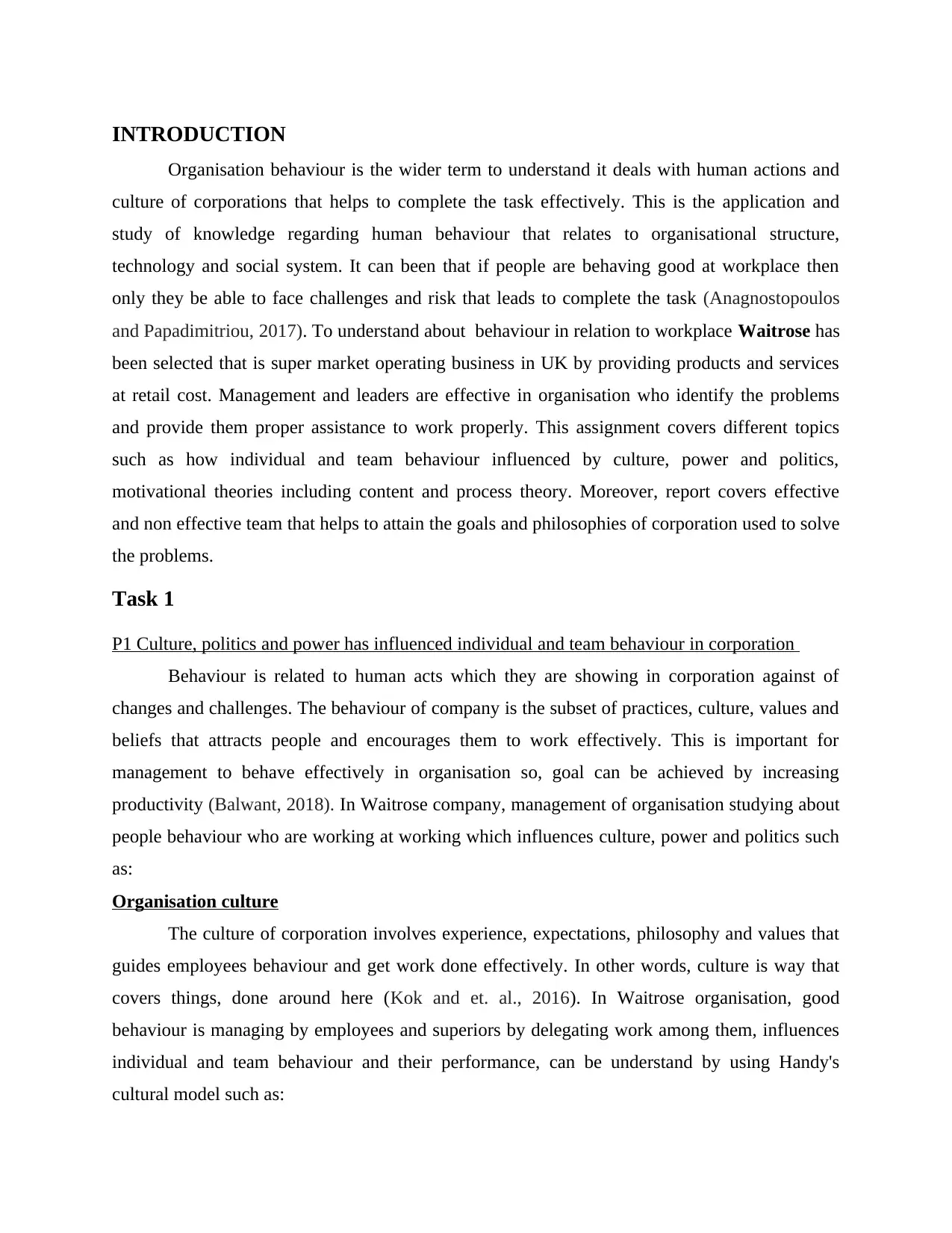
INTRODUCTION
Organisation behaviour is the wider term to understand it deals with human actions and
culture of corporations that helps to complete the task effectively. This is the application and
study of knowledge regarding human behaviour that relates to organisational structure,
technology and social system. It can been that if people are behaving good at workplace then
only they be able to face challenges and risk that leads to complete the task (Anagnostopoulos
and Papadimitriou, 2017). To understand about behaviour in relation to workplace Waitrose has
been selected that is super market operating business in UK by providing products and services
at retail cost. Management and leaders are effective in organisation who identify the problems
and provide them proper assistance to work properly. This assignment covers different topics
such as how individual and team behaviour influenced by culture, power and politics,
motivational theories including content and process theory. Moreover, report covers effective
and non effective team that helps to attain the goals and philosophies of corporation used to solve
the problems.
Task 1
P1 Culture, politics and power has influenced individual and team behaviour in corporation
Behaviour is related to human acts which they are showing in corporation against of
changes and challenges. The behaviour of company is the subset of practices, culture, values and
beliefs that attracts people and encourages them to work effectively. This is important for
management to behave effectively in organisation so, goal can be achieved by increasing
productivity (Balwant, 2018). In Waitrose company, management of organisation studying about
people behaviour who are working at working which influences culture, power and politics such
as:
Organisation culture
The culture of corporation involves experience, expectations, philosophy and values that
guides employees behaviour and get work done effectively. In other words, culture is way that
covers things, done around here (Kok and et. al., 2016). In Waitrose organisation, good
behaviour is managing by employees and superiors by delegating work among them, influences
individual and team behaviour and their performance, can be understand by using Handy's
cultural model such as:
Organisation behaviour is the wider term to understand it deals with human actions and
culture of corporations that helps to complete the task effectively. This is the application and
study of knowledge regarding human behaviour that relates to organisational structure,
technology and social system. It can been that if people are behaving good at workplace then
only they be able to face challenges and risk that leads to complete the task (Anagnostopoulos
and Papadimitriou, 2017). To understand about behaviour in relation to workplace Waitrose has
been selected that is super market operating business in UK by providing products and services
at retail cost. Management and leaders are effective in organisation who identify the problems
and provide them proper assistance to work properly. This assignment covers different topics
such as how individual and team behaviour influenced by culture, power and politics,
motivational theories including content and process theory. Moreover, report covers effective
and non effective team that helps to attain the goals and philosophies of corporation used to solve
the problems.
Task 1
P1 Culture, politics and power has influenced individual and team behaviour in corporation
Behaviour is related to human acts which they are showing in corporation against of
changes and challenges. The behaviour of company is the subset of practices, culture, values and
beliefs that attracts people and encourages them to work effectively. This is important for
management to behave effectively in organisation so, goal can be achieved by increasing
productivity (Balwant, 2018). In Waitrose company, management of organisation studying about
people behaviour who are working at working which influences culture, power and politics such
as:
Organisation culture
The culture of corporation involves experience, expectations, philosophy and values that
guides employees behaviour and get work done effectively. In other words, culture is way that
covers things, done around here (Kok and et. al., 2016). In Waitrose organisation, good
behaviour is managing by employees and superiors by delegating work among them, influences
individual and team behaviour and their performance, can be understand by using Handy's
cultural model such as:
⊘ This is a preview!⊘
Do you want full access?
Subscribe today to unlock all pages.

Trusted by 1+ million students worldwide
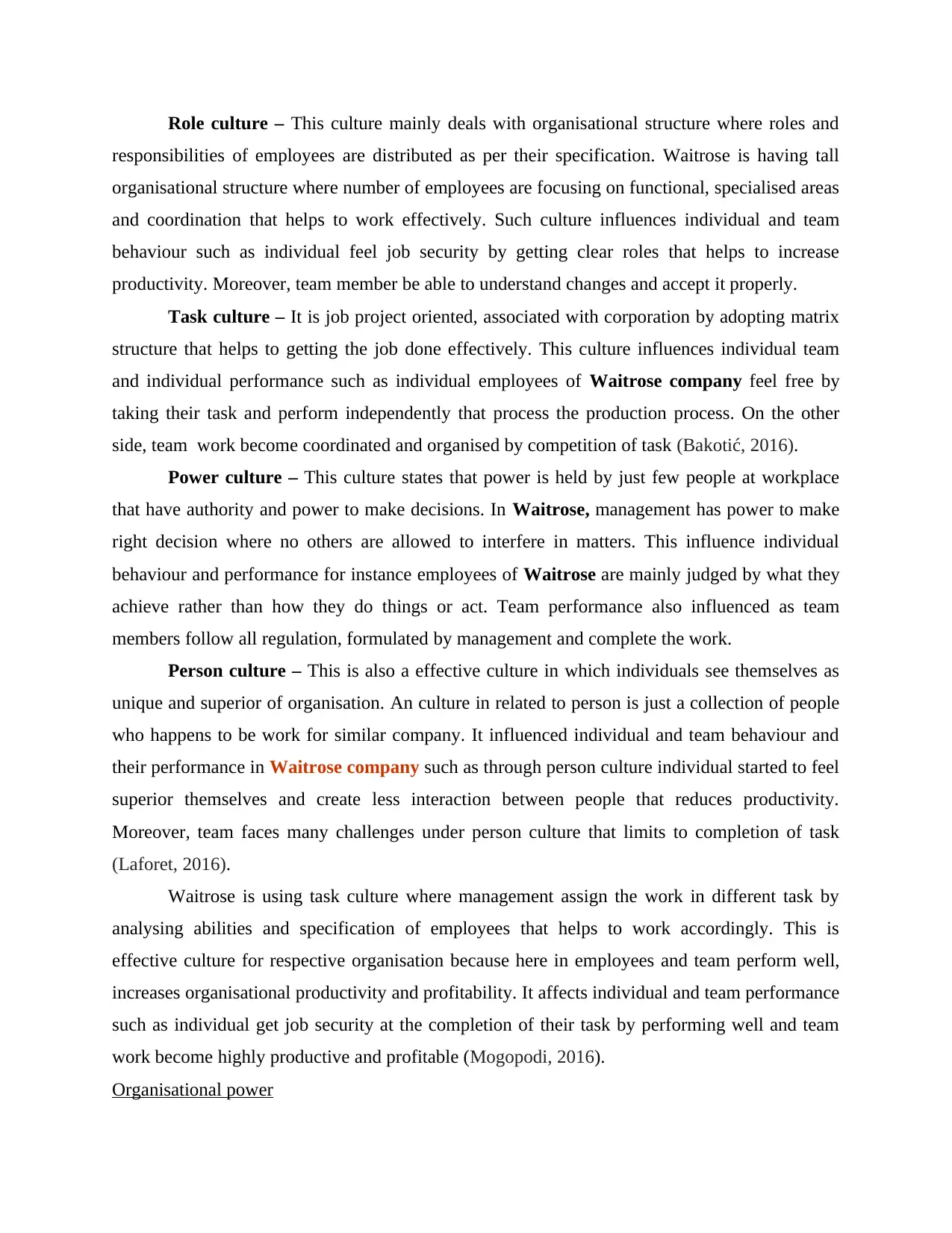
Role culture – This culture mainly deals with organisational structure where roles and
responsibilities of employees are distributed as per their specification. Waitrose is having tall
organisational structure where number of employees are focusing on functional, specialised areas
and coordination that helps to work effectively. Such culture influences individual and team
behaviour such as individual feel job security by getting clear roles that helps to increase
productivity. Moreover, team member be able to understand changes and accept it properly.
Task culture – It is job project oriented, associated with corporation by adopting matrix
structure that helps to getting the job done effectively. This culture influences individual team
and individual performance such as individual employees of Waitrose company feel free by
taking their task and perform independently that process the production process. On the other
side, team work become coordinated and organised by competition of task (Bakotić, 2016).
Power culture – This culture states that power is held by just few people at workplace
that have authority and power to make decisions. In Waitrose, management has power to make
right decision where no others are allowed to interfere in matters. This influence individual
behaviour and performance for instance employees of Waitrose are mainly judged by what they
achieve rather than how they do things or act. Team performance also influenced as team
members follow all regulation, formulated by management and complete the work.
Person culture – This is also a effective culture in which individuals see themselves as
unique and superior of organisation. An culture in related to person is just a collection of people
who happens to be work for similar company. It influenced individual and team behaviour and
their performance in Waitrose company such as through person culture individual started to feel
superior themselves and create less interaction between people that reduces productivity.
Moreover, team faces many challenges under person culture that limits to completion of task
(Laforet, 2016).
Waitrose is using task culture where management assign the work in different task by
analysing abilities and specification of employees that helps to work accordingly. This is
effective culture for respective organisation because here in employees and team perform well,
increases organisational productivity and profitability. It affects individual and team performance
such as individual get job security at the completion of their task by performing well and team
work become highly productive and profitable (Mogopodi, 2016).
Organisational power
responsibilities of employees are distributed as per their specification. Waitrose is having tall
organisational structure where number of employees are focusing on functional, specialised areas
and coordination that helps to work effectively. Such culture influences individual and team
behaviour such as individual feel job security by getting clear roles that helps to increase
productivity. Moreover, team member be able to understand changes and accept it properly.
Task culture – It is job project oriented, associated with corporation by adopting matrix
structure that helps to getting the job done effectively. This culture influences individual team
and individual performance such as individual employees of Waitrose company feel free by
taking their task and perform independently that process the production process. On the other
side, team work become coordinated and organised by competition of task (Bakotić, 2016).
Power culture – This culture states that power is held by just few people at workplace
that have authority and power to make decisions. In Waitrose, management has power to make
right decision where no others are allowed to interfere in matters. This influence individual
behaviour and performance for instance employees of Waitrose are mainly judged by what they
achieve rather than how they do things or act. Team performance also influenced as team
members follow all regulation, formulated by management and complete the work.
Person culture – This is also a effective culture in which individuals see themselves as
unique and superior of organisation. An culture in related to person is just a collection of people
who happens to be work for similar company. It influenced individual and team behaviour and
their performance in Waitrose company such as through person culture individual started to feel
superior themselves and create less interaction between people that reduces productivity.
Moreover, team faces many challenges under person culture that limits to completion of task
(Laforet, 2016).
Waitrose is using task culture where management assign the work in different task by
analysing abilities and specification of employees that helps to work accordingly. This is
effective culture for respective organisation because here in employees and team perform well,
increases organisational productivity and profitability. It affects individual and team performance
such as individual get job security at the completion of their task by performing well and team
work become highly productive and profitable (Mogopodi, 2016).
Organisational power
Paraphrase This Document
Need a fresh take? Get an instant paraphrase of this document with our AI Paraphraser
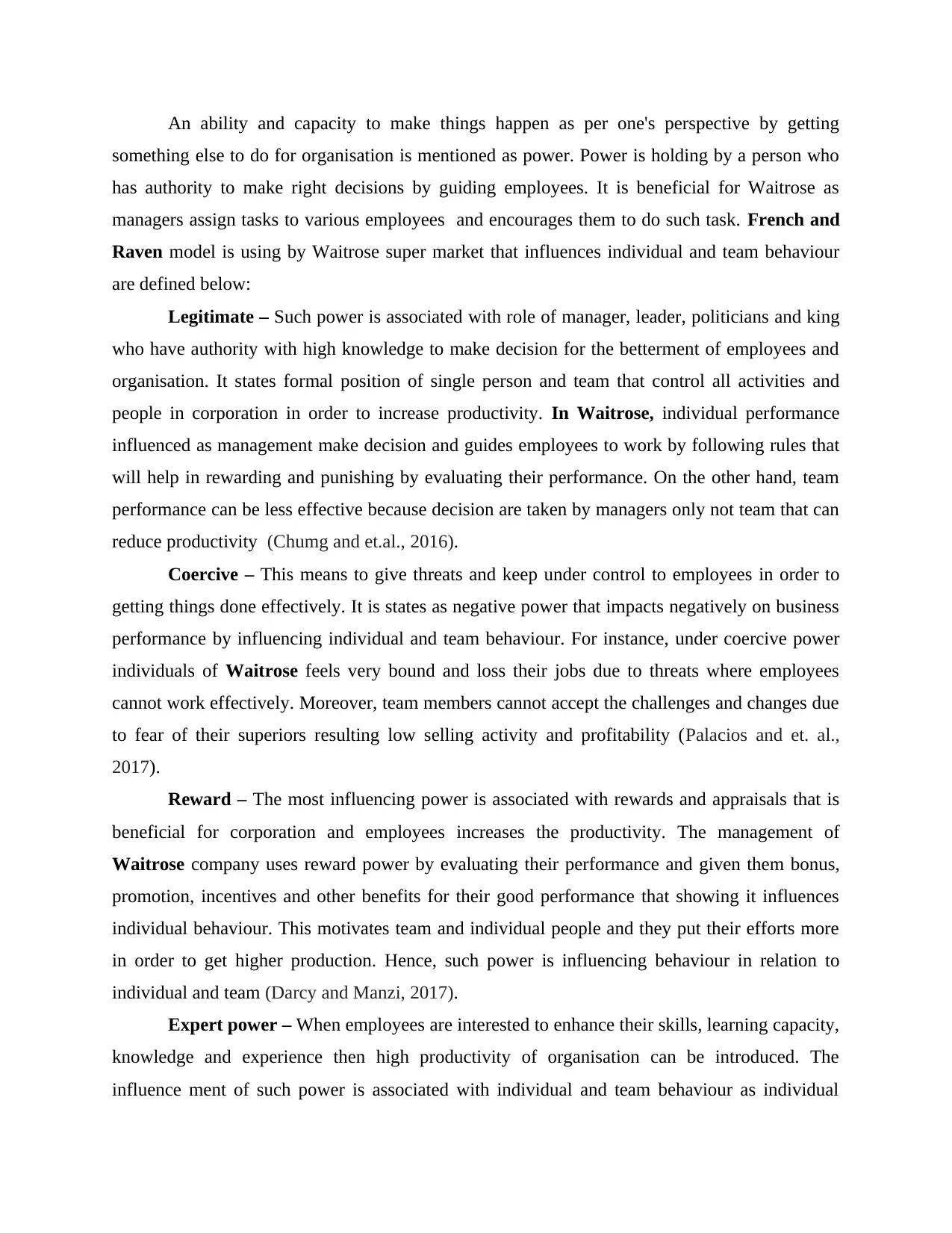
An ability and capacity to make things happen as per one's perspective by getting
something else to do for organisation is mentioned as power. Power is holding by a person who
has authority to make right decisions by guiding employees. It is beneficial for Waitrose as
managers assign tasks to various employees and encourages them to do such task. French and
Raven model is using by Waitrose super market that influences individual and team behaviour
are defined below:
Legitimate – Such power is associated with role of manager, leader, politicians and king
who have authority with high knowledge to make decision for the betterment of employees and
organisation. It states formal position of single person and team that control all activities and
people in corporation in order to increase productivity. In Waitrose, individual performance
influenced as management make decision and guides employees to work by following rules that
will help in rewarding and punishing by evaluating their performance. On the other hand, team
performance can be less effective because decision are taken by managers only not team that can
reduce productivity (Chumg and et.al., 2016).
Coercive – This means to give threats and keep under control to employees in order to
getting things done effectively. It is states as negative power that impacts negatively on business
performance by influencing individual and team behaviour. For instance, under coercive power
individuals of Waitrose feels very bound and loss their jobs due to threats where employees
cannot work effectively. Moreover, team members cannot accept the challenges and changes due
to fear of their superiors resulting low selling activity and profitability (Palacios and et. al.,
2017).
Reward – The most influencing power is associated with rewards and appraisals that is
beneficial for corporation and employees increases the productivity. The management of
Waitrose company uses reward power by evaluating their performance and given them bonus,
promotion, incentives and other benefits for their good performance that showing it influences
individual behaviour. This motivates team and individual people and they put their efforts more
in order to get higher production. Hence, such power is influencing behaviour in relation to
individual and team (Darcy and Manzi, 2017).
Expert power – When employees are interested to enhance their skills, learning capacity,
knowledge and experience then high productivity of organisation can be introduced. The
influence ment of such power is associated with individual and team behaviour as individual
something else to do for organisation is mentioned as power. Power is holding by a person who
has authority to make right decisions by guiding employees. It is beneficial for Waitrose as
managers assign tasks to various employees and encourages them to do such task. French and
Raven model is using by Waitrose super market that influences individual and team behaviour
are defined below:
Legitimate – Such power is associated with role of manager, leader, politicians and king
who have authority with high knowledge to make decision for the betterment of employees and
organisation. It states formal position of single person and team that control all activities and
people in corporation in order to increase productivity. In Waitrose, individual performance
influenced as management make decision and guides employees to work by following rules that
will help in rewarding and punishing by evaluating their performance. On the other hand, team
performance can be less effective because decision are taken by managers only not team that can
reduce productivity (Chumg and et.al., 2016).
Coercive – This means to give threats and keep under control to employees in order to
getting things done effectively. It is states as negative power that impacts negatively on business
performance by influencing individual and team behaviour. For instance, under coercive power
individuals of Waitrose feels very bound and loss their jobs due to threats where employees
cannot work effectively. Moreover, team members cannot accept the challenges and changes due
to fear of their superiors resulting low selling activity and profitability (Palacios and et. al.,
2017).
Reward – The most influencing power is associated with rewards and appraisals that is
beneficial for corporation and employees increases the productivity. The management of
Waitrose company uses reward power by evaluating their performance and given them bonus,
promotion, incentives and other benefits for their good performance that showing it influences
individual behaviour. This motivates team and individual people and they put their efforts more
in order to get higher production. Hence, such power is influencing behaviour in relation to
individual and team (Darcy and Manzi, 2017).
Expert power – When employees are interested to enhance their skills, learning capacity,
knowledge and experience then high productivity of organisation can be introduced. The
influence ment of such power is associated with individual and team behaviour as individual
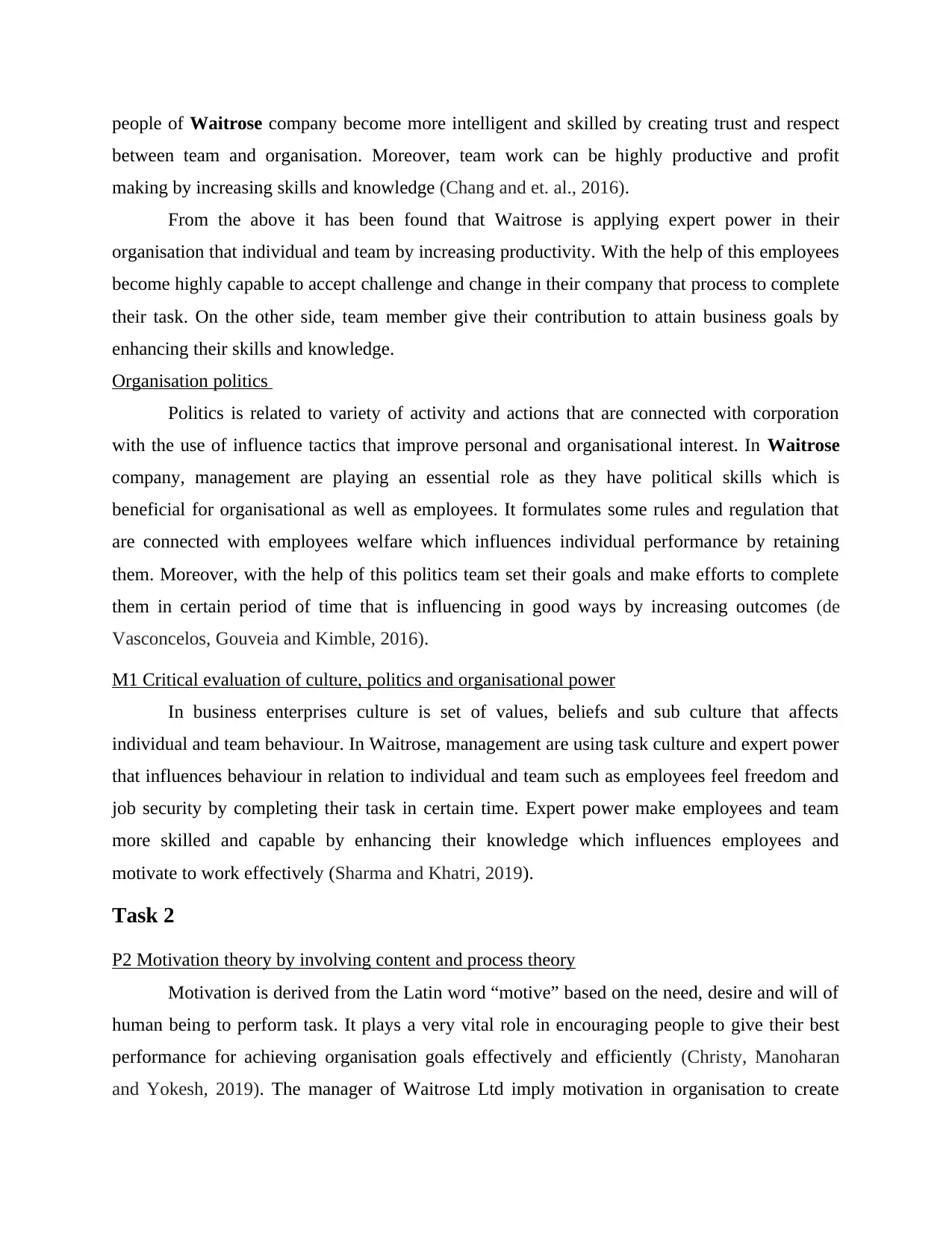
people of Waitrose company become more intelligent and skilled by creating trust and respect
between team and organisation. Moreover, team work can be highly productive and profit
making by increasing skills and knowledge (Chang and et. al., 2016).
From the above it has been found that Waitrose is applying expert power in their
organisation that individual and team by increasing productivity. With the help of this employees
become highly capable to accept challenge and change in their company that process to complete
their task. On the other side, team member give their contribution to attain business goals by
enhancing their skills and knowledge.
Organisation politics
Politics is related to variety of activity and actions that are connected with corporation
with the use of influence tactics that improve personal and organisational interest. In Waitrose
company, management are playing an essential role as they have political skills which is
beneficial for organisational as well as employees. It formulates some rules and regulation that
are connected with employees welfare which influences individual performance by retaining
them. Moreover, with the help of this politics team set their goals and make efforts to complete
them in certain period of time that is influencing in good ways by increasing outcomes (de
Vasconcelos, Gouveia and Kimble, 2016).
M1 Critical evaluation of culture, politics and organisational power
In business enterprises culture is set of values, beliefs and sub culture that affects
individual and team behaviour. In Waitrose, management are using task culture and expert power
that influences behaviour in relation to individual and team such as employees feel freedom and
job security by completing their task in certain time. Expert power make employees and team
more skilled and capable by enhancing their knowledge which influences employees and
motivate to work effectively (Sharma and Khatri, 2019).
Task 2
P2 Motivation theory by involving content and process theory
Motivation is derived from the Latin word “motive” based on the need, desire and will of
human being to perform task. It plays a very vital role in encouraging people to give their best
performance for achieving organisation goals effectively and efficiently (Christy, Manoharan
and Yokesh, 2019). The manager of Waitrose Ltd imply motivation in organisation to create
between team and organisation. Moreover, team work can be highly productive and profit
making by increasing skills and knowledge (Chang and et. al., 2016).
From the above it has been found that Waitrose is applying expert power in their
organisation that individual and team by increasing productivity. With the help of this employees
become highly capable to accept challenge and change in their company that process to complete
their task. On the other side, team member give their contribution to attain business goals by
enhancing their skills and knowledge.
Organisation politics
Politics is related to variety of activity and actions that are connected with corporation
with the use of influence tactics that improve personal and organisational interest. In Waitrose
company, management are playing an essential role as they have political skills which is
beneficial for organisational as well as employees. It formulates some rules and regulation that
are connected with employees welfare which influences individual performance by retaining
them. Moreover, with the help of this politics team set their goals and make efforts to complete
them in certain period of time that is influencing in good ways by increasing outcomes (de
Vasconcelos, Gouveia and Kimble, 2016).
M1 Critical evaluation of culture, politics and organisational power
In business enterprises culture is set of values, beliefs and sub culture that affects
individual and team behaviour. In Waitrose, management are using task culture and expert power
that influences behaviour in relation to individual and team such as employees feel freedom and
job security by completing their task in certain time. Expert power make employees and team
more skilled and capable by enhancing their knowledge which influences employees and
motivate to work effectively (Sharma and Khatri, 2019).
Task 2
P2 Motivation theory by involving content and process theory
Motivation is derived from the Latin word “motive” based on the need, desire and will of
human being to perform task. It plays a very vital role in encouraging people to give their best
performance for achieving organisation goals effectively and efficiently (Christy, Manoharan
and Yokesh, 2019). The manager of Waitrose Ltd imply motivation in organisation to create
⊘ This is a preview!⊘
Do you want full access?
Subscribe today to unlock all pages.

Trusted by 1+ million students worldwide
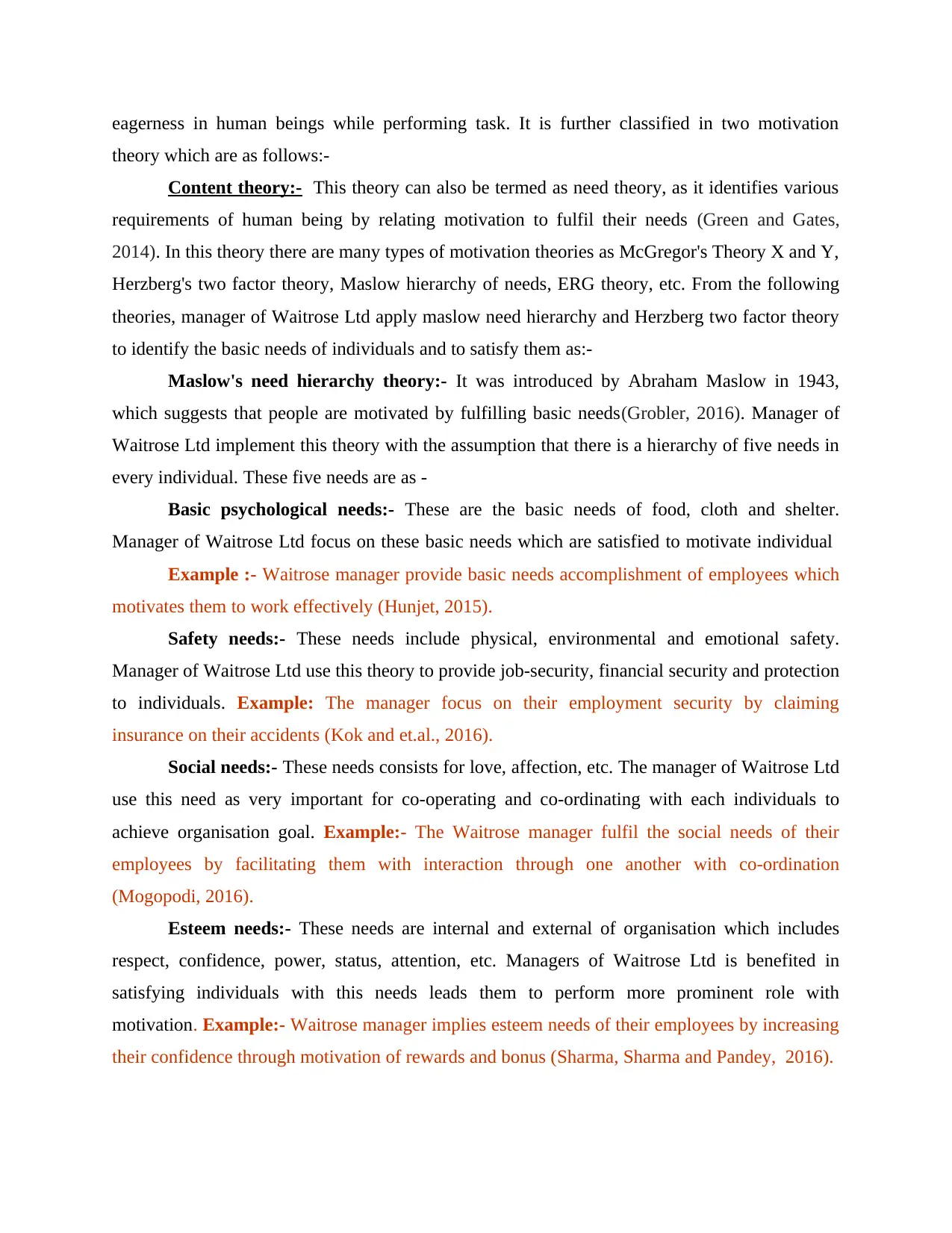
eagerness in human beings while performing task. It is further classified in two motivation
theory which are as follows:-
Content theory:- This theory can also be termed as need theory, as it identifies various
requirements of human being by relating motivation to fulfil their needs (Green and Gates,
2014). In this theory there are many types of motivation theories as McGregor's Theory X and Y,
Herzberg's two factor theory, Maslow hierarchy of needs, ERG theory, etc. From the following
theories, manager of Waitrose Ltd apply maslow need hierarchy and Herzberg two factor theory
to identify the basic needs of individuals and to satisfy them as:-
Maslow's need hierarchy theory:- It was introduced by Abraham Maslow in 1943,
which suggests that people are motivated by fulfilling basic needs(Grobler, 2016). Manager of
Waitrose Ltd implement this theory with the assumption that there is a hierarchy of five needs in
every individual. These five needs are as -
Basic psychological needs:- These are the basic needs of food, cloth and shelter.
Manager of Waitrose Ltd focus on these basic needs which are satisfied to motivate individual
Example :- Waitrose manager provide basic needs accomplishment of employees which
motivates them to work effectively (Hunjet, 2015).
Safety needs:- These needs include physical, environmental and emotional safety.
Manager of Waitrose Ltd use this theory to provide job-security, financial security and protection
to individuals. Example: The manager focus on their employment security by claiming
insurance on their accidents (Kok and et.al., 2016).
Social needs:- These needs consists for love, affection, etc. The manager of Waitrose Ltd
use this need as very important for co-operating and co-ordinating with each individuals to
achieve organisation goal. Example:- The Waitrose manager fulfil the social needs of their
employees by facilitating them with interaction through one another with co-ordination
(Mogopodi, 2016).
Esteem needs:- These needs are internal and external of organisation which includes
respect, confidence, power, status, attention, etc. Managers of Waitrose Ltd is benefited in
satisfying individuals with this needs leads them to perform more prominent role with
motivation. Example:- Waitrose manager implies esteem needs of their employees by increasing
their confidence through motivation of rewards and bonus (Sharma, Sharma and Pandey, 2016).
theory which are as follows:-
Content theory:- This theory can also be termed as need theory, as it identifies various
requirements of human being by relating motivation to fulfil their needs (Green and Gates,
2014). In this theory there are many types of motivation theories as McGregor's Theory X and Y,
Herzberg's two factor theory, Maslow hierarchy of needs, ERG theory, etc. From the following
theories, manager of Waitrose Ltd apply maslow need hierarchy and Herzberg two factor theory
to identify the basic needs of individuals and to satisfy them as:-
Maslow's need hierarchy theory:- It was introduced by Abraham Maslow in 1943,
which suggests that people are motivated by fulfilling basic needs(Grobler, 2016). Manager of
Waitrose Ltd implement this theory with the assumption that there is a hierarchy of five needs in
every individual. These five needs are as -
Basic psychological needs:- These are the basic needs of food, cloth and shelter.
Manager of Waitrose Ltd focus on these basic needs which are satisfied to motivate individual
Example :- Waitrose manager provide basic needs accomplishment of employees which
motivates them to work effectively (Hunjet, 2015).
Safety needs:- These needs include physical, environmental and emotional safety.
Manager of Waitrose Ltd use this theory to provide job-security, financial security and protection
to individuals. Example: The manager focus on their employment security by claiming
insurance on their accidents (Kok and et.al., 2016).
Social needs:- These needs consists for love, affection, etc. The manager of Waitrose Ltd
use this need as very important for co-operating and co-ordinating with each individuals to
achieve organisation goal. Example:- The Waitrose manager fulfil the social needs of their
employees by facilitating them with interaction through one another with co-ordination
(Mogopodi, 2016).
Esteem needs:- These needs are internal and external of organisation which includes
respect, confidence, power, status, attention, etc. Managers of Waitrose Ltd is benefited in
satisfying individuals with this needs leads them to perform more prominent role with
motivation. Example:- Waitrose manager implies esteem needs of their employees by increasing
their confidence through motivation of rewards and bonus (Sharma, Sharma and Pandey, 2016).
Paraphrase This Document
Need a fresh take? Get an instant paraphrase of this document with our AI Paraphraser
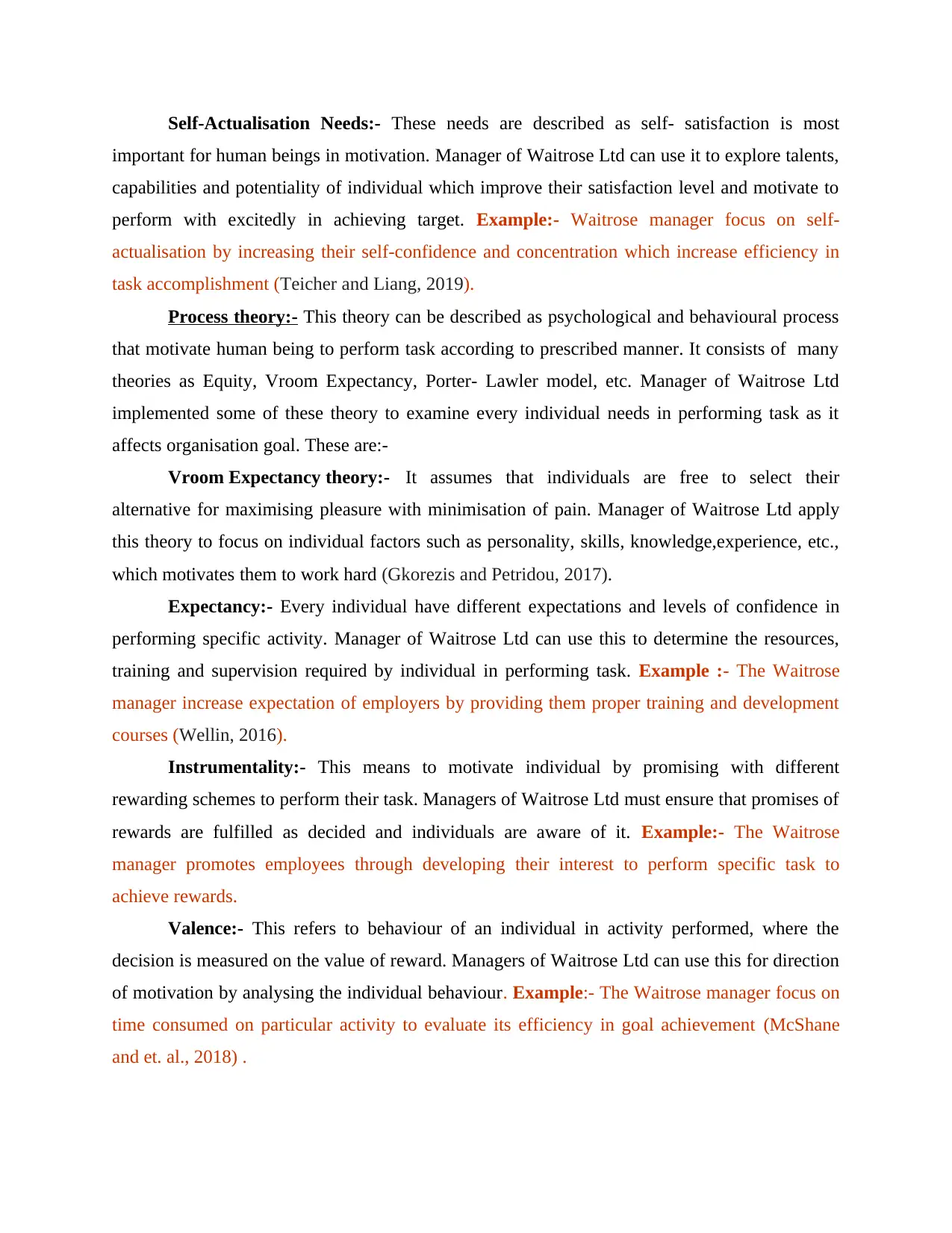
Self-Actualisation Needs:- These needs are described as self- satisfaction is most
important for human beings in motivation. Manager of Waitrose Ltd can use it to explore talents,
capabilities and potentiality of individual which improve their satisfaction level and motivate to
perform with excitedly in achieving target. Example:- Waitrose manager focus on self-
actualisation by increasing their self-confidence and concentration which increase efficiency in
task accomplishment (Teicher and Liang, 2019).
Process theory:- This theory can be described as psychological and behavioural process
that motivate human being to perform task according to prescribed manner. It consists of many
theories as Equity, Vroom Expectancy, Porter- Lawler model, etc. Manager of Waitrose Ltd
implemented some of these theory to examine every individual needs in performing task as it
affects organisation goal. These are:-
Vroom Expectancy theory:- It assumes that individuals are free to select their
alternative for maximising pleasure with minimisation of pain. Manager of Waitrose Ltd apply
this theory to focus on individual factors such as personality, skills, knowledge,experience, etc.,
which motivates them to work hard (Gkorezis and Petridou, 2017).
Expectancy:- Every individual have different expectations and levels of confidence in
performing specific activity. Manager of Waitrose Ltd can use this to determine the resources,
training and supervision required by individual in performing task. Example :- The Waitrose
manager increase expectation of employers by providing them proper training and development
courses (Wellin, 2016).
Instrumentality:- This means to motivate individual by promising with different
rewarding schemes to perform their task. Managers of Waitrose Ltd must ensure that promises of
rewards are fulfilled as decided and individuals are aware of it. Example:- The Waitrose
manager promotes employees through developing their interest to perform specific task to
achieve rewards.
Valence:- This refers to behaviour of an individual in activity performed, where the
decision is measured on the value of reward. Managers of Waitrose Ltd can use this for direction
of motivation by analysing the individual behaviour. Example:- The Waitrose manager focus on
time consumed on particular activity to evaluate its efficiency in goal achievement (McShane
and et. al., 2018) .
important for human beings in motivation. Manager of Waitrose Ltd can use it to explore talents,
capabilities and potentiality of individual which improve their satisfaction level and motivate to
perform with excitedly in achieving target. Example:- Waitrose manager focus on self-
actualisation by increasing their self-confidence and concentration which increase efficiency in
task accomplishment (Teicher and Liang, 2019).
Process theory:- This theory can be described as psychological and behavioural process
that motivate human being to perform task according to prescribed manner. It consists of many
theories as Equity, Vroom Expectancy, Porter- Lawler model, etc. Manager of Waitrose Ltd
implemented some of these theory to examine every individual needs in performing task as it
affects organisation goal. These are:-
Vroom Expectancy theory:- It assumes that individuals are free to select their
alternative for maximising pleasure with minimisation of pain. Manager of Waitrose Ltd apply
this theory to focus on individual factors such as personality, skills, knowledge,experience, etc.,
which motivates them to work hard (Gkorezis and Petridou, 2017).
Expectancy:- Every individual have different expectations and levels of confidence in
performing specific activity. Manager of Waitrose Ltd can use this to determine the resources,
training and supervision required by individual in performing task. Example :- The Waitrose
manager increase expectation of employers by providing them proper training and development
courses (Wellin, 2016).
Instrumentality:- This means to motivate individual by promising with different
rewarding schemes to perform their task. Managers of Waitrose Ltd must ensure that promises of
rewards are fulfilled as decided and individuals are aware of it. Example:- The Waitrose
manager promotes employees through developing their interest to perform specific task to
achieve rewards.
Valence:- This refers to behaviour of an individual in activity performed, where the
decision is measured on the value of reward. Managers of Waitrose Ltd can use this for direction
of motivation by analysing the individual behaviour. Example:- The Waitrose manager focus on
time consumed on particular activity to evaluate its efficiency in goal achievement (McShane
and et. al., 2018) .
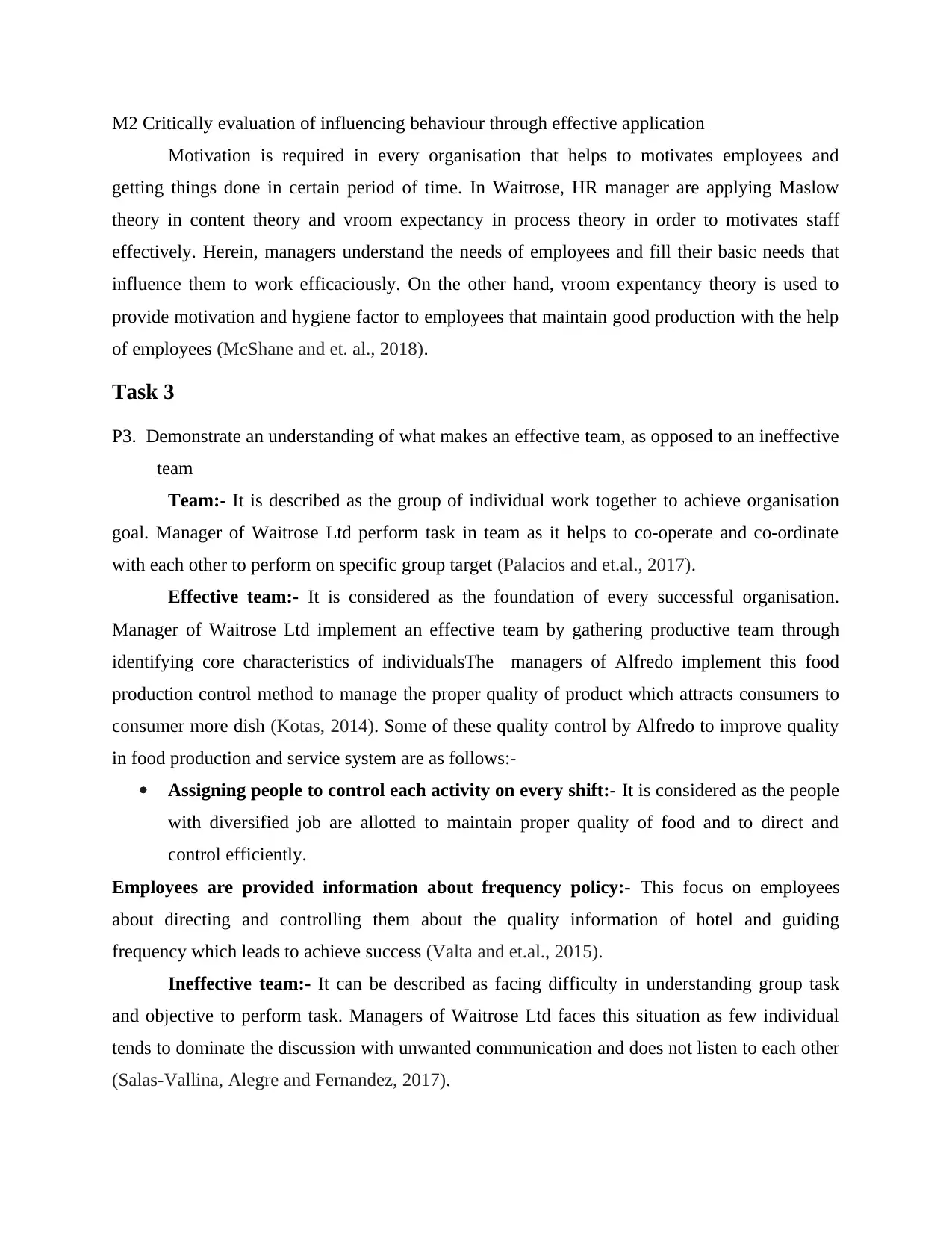
M2 Critically evaluation of influencing behaviour through effective application
Motivation is required in every organisation that helps to motivates employees and
getting things done in certain period of time. In Waitrose, HR manager are applying Maslow
theory in content theory and vroom expectancy in process theory in order to motivates staff
effectively. Herein, managers understand the needs of employees and fill their basic needs that
influence them to work efficaciously. On the other hand, vroom expentancy theory is used to
provide motivation and hygiene factor to employees that maintain good production with the help
of employees (McShane and et. al., 2018).
Task 3
P3. Demonstrate an understanding of what makes an effective team, as opposed to an ineffective
team
Team:- It is described as the group of individual work together to achieve organisation
goal. Manager of Waitrose Ltd perform task in team as it helps to co-operate and co-ordinate
with each other to perform on specific group target (Palacios and et.al., 2017).
Effective team:- It is considered as the foundation of every successful organisation.
Manager of Waitrose Ltd implement an effective team by gathering productive team through
identifying core characteristics of individualsThe managers of Alfredo implement this food
production control method to manage the proper quality of product which attracts consumers to
consumer more dish (Kotas, 2014). Some of these quality control by Alfredo to improve quality
in food production and service system are as follows:-
Assigning people to control each activity on every shift:- It is considered as the people
with diversified job are allotted to maintain proper quality of food and to direct and
control efficiently.
Employees are provided information about frequency policy:- This focus on employees
about directing and controlling them about the quality information of hotel and guiding
frequency which leads to achieve success (Valta and et.al., 2015).
Ineffective team:- It can be described as facing difficulty in understanding group task
and objective to perform task. Managers of Waitrose Ltd faces this situation as few individual
tends to dominate the discussion with unwanted communication and does not listen to each other
(Salas-Vallina, Alegre and Fernandez, 2017).
Motivation is required in every organisation that helps to motivates employees and
getting things done in certain period of time. In Waitrose, HR manager are applying Maslow
theory in content theory and vroom expectancy in process theory in order to motivates staff
effectively. Herein, managers understand the needs of employees and fill their basic needs that
influence them to work efficaciously. On the other hand, vroom expentancy theory is used to
provide motivation and hygiene factor to employees that maintain good production with the help
of employees (McShane and et. al., 2018).
Task 3
P3. Demonstrate an understanding of what makes an effective team, as opposed to an ineffective
team
Team:- It is described as the group of individual work together to achieve organisation
goal. Manager of Waitrose Ltd perform task in team as it helps to co-operate and co-ordinate
with each other to perform on specific group target (Palacios and et.al., 2017).
Effective team:- It is considered as the foundation of every successful organisation.
Manager of Waitrose Ltd implement an effective team by gathering productive team through
identifying core characteristics of individualsThe managers of Alfredo implement this food
production control method to manage the proper quality of product which attracts consumers to
consumer more dish (Kotas, 2014). Some of these quality control by Alfredo to improve quality
in food production and service system are as follows:-
Assigning people to control each activity on every shift:- It is considered as the people
with diversified job are allotted to maintain proper quality of food and to direct and
control efficiently.
Employees are provided information about frequency policy:- This focus on employees
about directing and controlling them about the quality information of hotel and guiding
frequency which leads to achieve success (Valta and et.al., 2015).
Ineffective team:- It can be described as facing difficulty in understanding group task
and objective to perform task. Managers of Waitrose Ltd faces this situation as few individual
tends to dominate the discussion with unwanted communication and does not listen to each other
(Salas-Vallina, Alegre and Fernandez, 2017).
⊘ This is a preview!⊘
Do you want full access?
Subscribe today to unlock all pages.

Trusted by 1+ million students worldwide
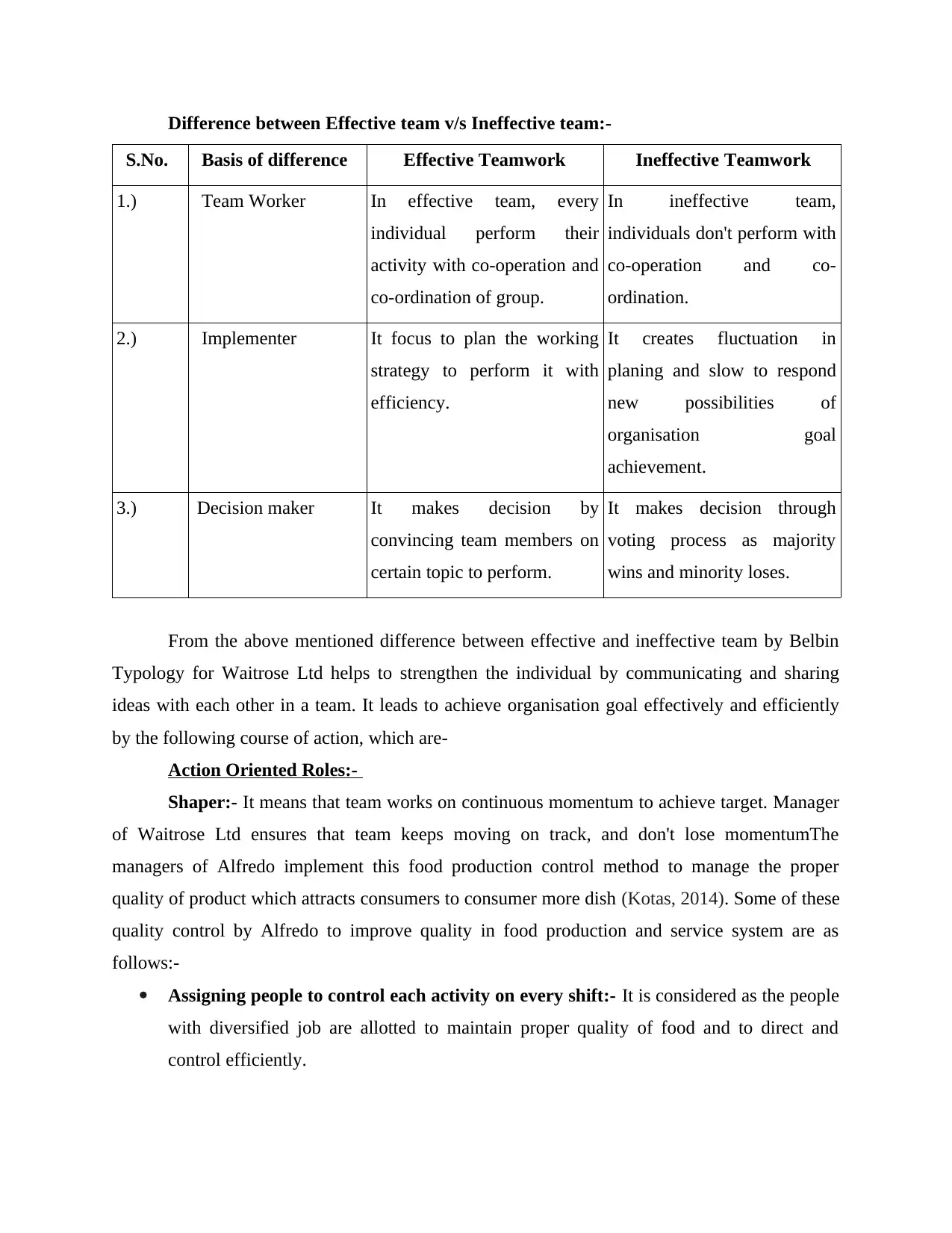
Difference between Effective team v/s Ineffective team:-
S.No. Basis of difference Effective Teamwork Ineffective Teamwork
1.) Team Worker In effective team, every
individual perform their
activity with co-operation and
co-ordination of group.
In ineffective team,
individuals don't perform with
co-operation and co-
ordination.
2.) Implementer It focus to plan the working
strategy to perform it with
efficiency.
It creates fluctuation in
planing and slow to respond
new possibilities of
organisation goal
achievement.
3.) Decision maker It makes decision by
convincing team members on
certain topic to perform.
It makes decision through
voting process as majority
wins and minority loses.
From the above mentioned difference between effective and ineffective team by Belbin
Typology for Waitrose Ltd helps to strengthen the individual by communicating and sharing
ideas with each other in a team. It leads to achieve organisation goal effectively and efficiently
by the following course of action, which are-
Action Oriented Roles:-
Shaper:- It means that team works on continuous momentum to achieve target. Manager
of Waitrose Ltd ensures that team keeps moving on track, and don't lose momentumThe
managers of Alfredo implement this food production control method to manage the proper
quality of product which attracts consumers to consumer more dish (Kotas, 2014). Some of these
quality control by Alfredo to improve quality in food production and service system are as
follows:-
Assigning people to control each activity on every shift:- It is considered as the people
with diversified job are allotted to maintain proper quality of food and to direct and
control efficiently.
S.No. Basis of difference Effective Teamwork Ineffective Teamwork
1.) Team Worker In effective team, every
individual perform their
activity with co-operation and
co-ordination of group.
In ineffective team,
individuals don't perform with
co-operation and co-
ordination.
2.) Implementer It focus to plan the working
strategy to perform it with
efficiency.
It creates fluctuation in
planing and slow to respond
new possibilities of
organisation goal
achievement.
3.) Decision maker It makes decision by
convincing team members on
certain topic to perform.
It makes decision through
voting process as majority
wins and minority loses.
From the above mentioned difference between effective and ineffective team by Belbin
Typology for Waitrose Ltd helps to strengthen the individual by communicating and sharing
ideas with each other in a team. It leads to achieve organisation goal effectively and efficiently
by the following course of action, which are-
Action Oriented Roles:-
Shaper:- It means that team works on continuous momentum to achieve target. Manager
of Waitrose Ltd ensures that team keeps moving on track, and don't lose momentumThe
managers of Alfredo implement this food production control method to manage the proper
quality of product which attracts consumers to consumer more dish (Kotas, 2014). Some of these
quality control by Alfredo to improve quality in food production and service system are as
follows:-
Assigning people to control each activity on every shift:- It is considered as the people
with diversified job are allotted to maintain proper quality of food and to direct and
control efficiently.
Paraphrase This Document
Need a fresh take? Get an instant paraphrase of this document with our AI Paraphraser
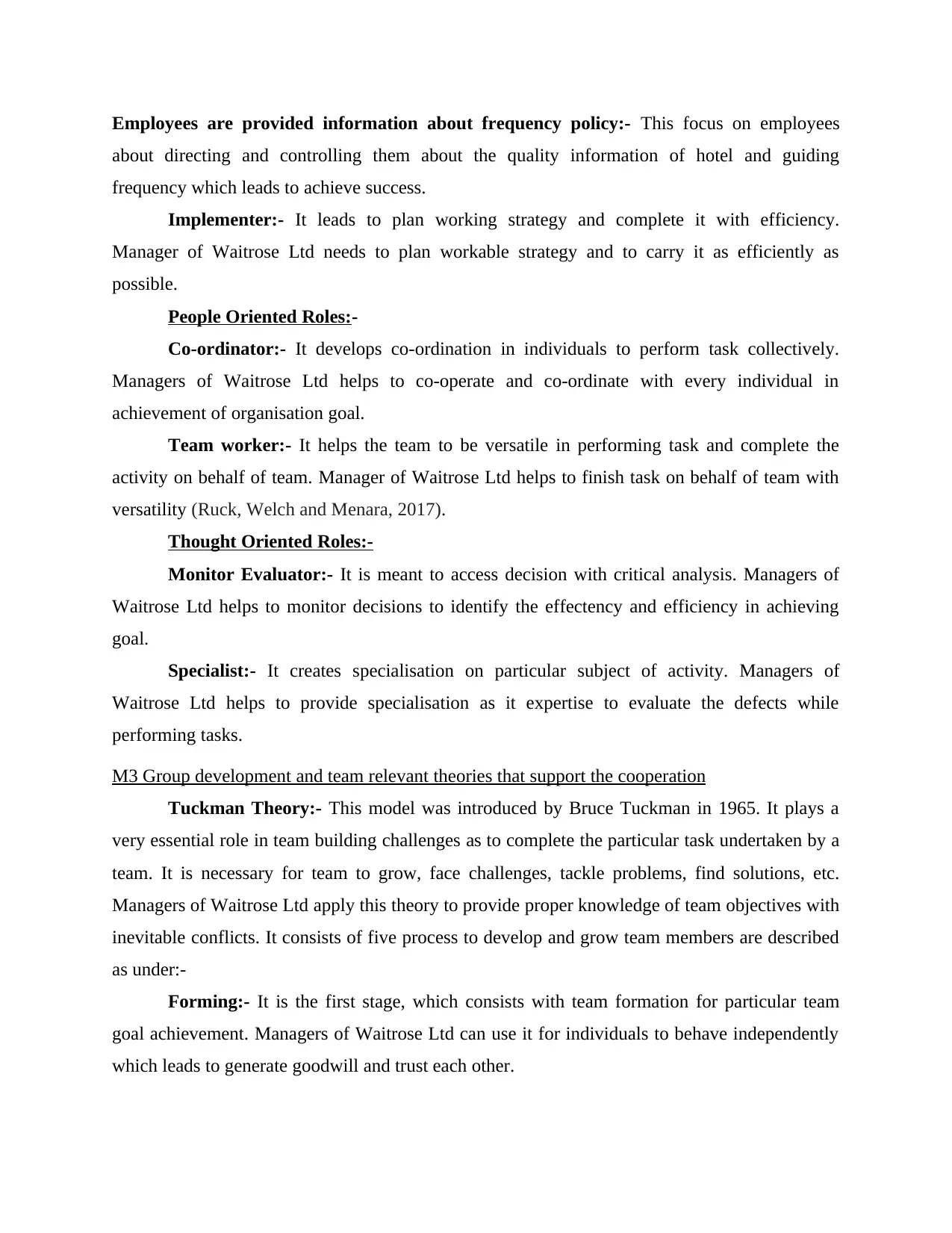
Employees are provided information about frequency policy:- This focus on employees
about directing and controlling them about the quality information of hotel and guiding
frequency which leads to achieve success.
Implementer:- It leads to plan working strategy and complete it with efficiency.
Manager of Waitrose Ltd needs to plan workable strategy and to carry it as efficiently as
possible.
People Oriented Roles:-
Co-ordinator:- It develops co-ordination in individuals to perform task collectively.
Managers of Waitrose Ltd helps to co-operate and co-ordinate with every individual in
achievement of organisation goal.
Team worker:- It helps the team to be versatile in performing task and complete the
activity on behalf of team. Manager of Waitrose Ltd helps to finish task on behalf of team with
versatility (Ruck, Welch and Menara, 2017).
Thought Oriented Roles:-
Monitor Evaluator:- It is meant to access decision with critical analysis. Managers of
Waitrose Ltd helps to monitor decisions to identify the effectency and efficiency in achieving
goal.
Specialist:- It creates specialisation on particular subject of activity. Managers of
Waitrose Ltd helps to provide specialisation as it expertise to evaluate the defects while
performing tasks.
M3 Group development and team relevant theories that support the cooperation
Tuckman Theory:- This model was introduced by Bruce Tuckman in 1965. It plays a
very essential role in team building challenges as to complete the particular task undertaken by a
team. It is necessary for team to grow, face challenges, tackle problems, find solutions, etc.
Managers of Waitrose Ltd apply this theory to provide proper knowledge of team objectives with
inevitable conflicts. It consists of five process to develop and grow team members are described
as under:-
Forming:- It is the first stage, which consists with team formation for particular team
goal achievement. Managers of Waitrose Ltd can use it for individuals to behave independently
which leads to generate goodwill and trust each other.
about directing and controlling them about the quality information of hotel and guiding
frequency which leads to achieve success.
Implementer:- It leads to plan working strategy and complete it with efficiency.
Manager of Waitrose Ltd needs to plan workable strategy and to carry it as efficiently as
possible.
People Oriented Roles:-
Co-ordinator:- It develops co-ordination in individuals to perform task collectively.
Managers of Waitrose Ltd helps to co-operate and co-ordinate with every individual in
achievement of organisation goal.
Team worker:- It helps the team to be versatile in performing task and complete the
activity on behalf of team. Manager of Waitrose Ltd helps to finish task on behalf of team with
versatility (Ruck, Welch and Menara, 2017).
Thought Oriented Roles:-
Monitor Evaluator:- It is meant to access decision with critical analysis. Managers of
Waitrose Ltd helps to monitor decisions to identify the effectency and efficiency in achieving
goal.
Specialist:- It creates specialisation on particular subject of activity. Managers of
Waitrose Ltd helps to provide specialisation as it expertise to evaluate the defects while
performing tasks.
M3 Group development and team relevant theories that support the cooperation
Tuckman Theory:- This model was introduced by Bruce Tuckman in 1965. It plays a
very essential role in team building challenges as to complete the particular task undertaken by a
team. It is necessary for team to grow, face challenges, tackle problems, find solutions, etc.
Managers of Waitrose Ltd apply this theory to provide proper knowledge of team objectives with
inevitable conflicts. It consists of five process to develop and grow team members are described
as under:-
Forming:- It is the first stage, which consists with team formation for particular team
goal achievement. Managers of Waitrose Ltd can use it for individuals to behave independently
which leads to generate goodwill and trust each other.
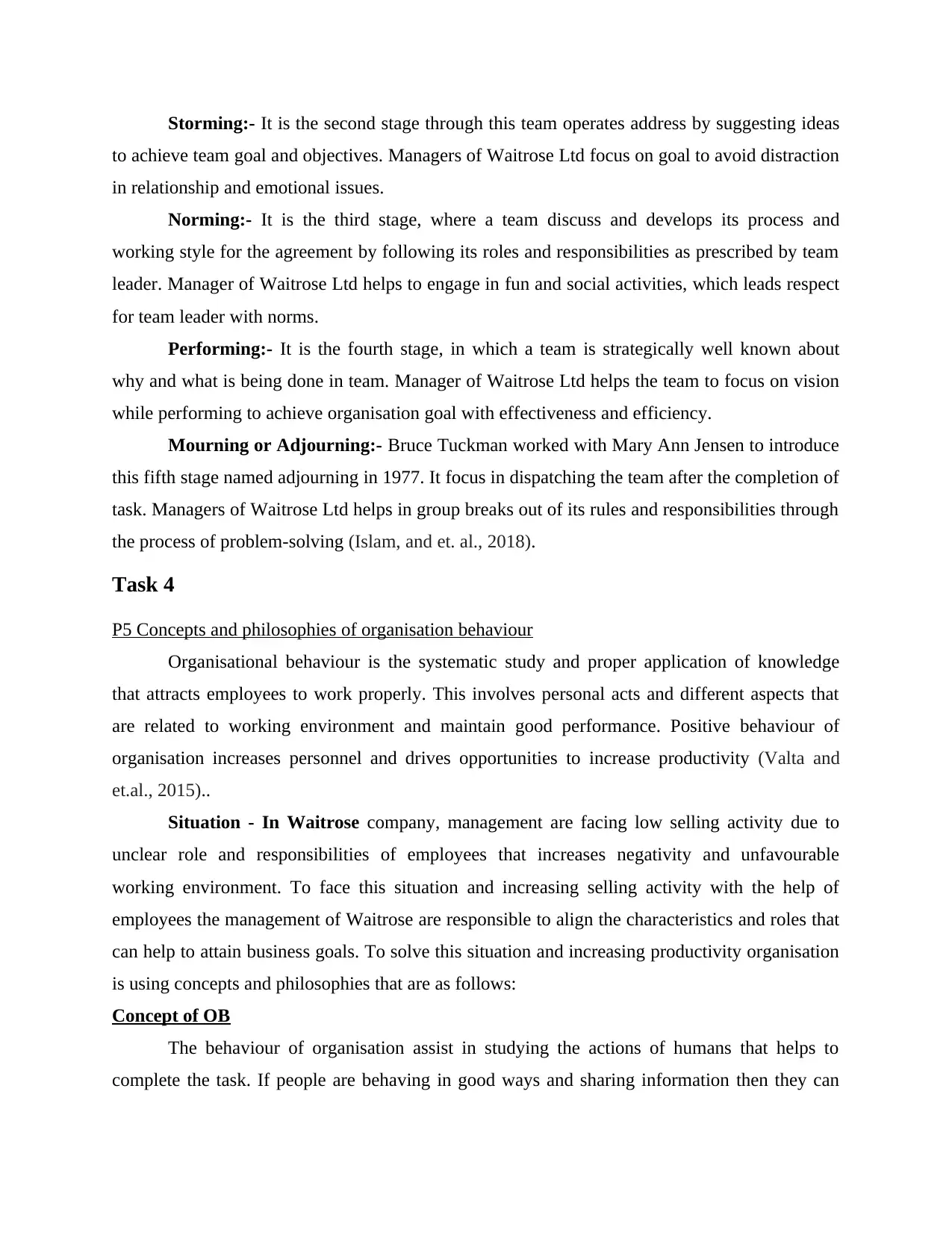
Storming:- It is the second stage through this team operates address by suggesting ideas
to achieve team goal and objectives. Managers of Waitrose Ltd focus on goal to avoid distraction
in relationship and emotional issues.
Norming:- It is the third stage, where a team discuss and develops its process and
working style for the agreement by following its roles and responsibilities as prescribed by team
leader. Manager of Waitrose Ltd helps to engage in fun and social activities, which leads respect
for team leader with norms.
Performing:- It is the fourth stage, in which a team is strategically well known about
why and what is being done in team. Manager of Waitrose Ltd helps the team to focus on vision
while performing to achieve organisation goal with effectiveness and efficiency.
Mourning or Adjourning:- Bruce Tuckman worked with Mary Ann Jensen to introduce
this fifth stage named adjourning in 1977. It focus in dispatching the team after the completion of
task. Managers of Waitrose Ltd helps in group breaks out of its rules and responsibilities through
the process of problem-solving (Islam, and et. al., 2018).
Task 4
P5 Concepts and philosophies of organisation behaviour
Organisational behaviour is the systematic study and proper application of knowledge
that attracts employees to work properly. This involves personal acts and different aspects that
are related to working environment and maintain good performance. Positive behaviour of
organisation increases personnel and drives opportunities to increase productivity (Valta and
et.al., 2015)..
Situation - In Waitrose company, management are facing low selling activity due to
unclear role and responsibilities of employees that increases negativity and unfavourable
working environment. To face this situation and increasing selling activity with the help of
employees the management of Waitrose are responsible to align the characteristics and roles that
can help to attain business goals. To solve this situation and increasing productivity organisation
is using concepts and philosophies that are as follows:
Concept of OB
The behaviour of organisation assist in studying the actions of humans that helps to
complete the task. If people are behaving in good ways and sharing information then they can
to achieve team goal and objectives. Managers of Waitrose Ltd focus on goal to avoid distraction
in relationship and emotional issues.
Norming:- It is the third stage, where a team discuss and develops its process and
working style for the agreement by following its roles and responsibilities as prescribed by team
leader. Manager of Waitrose Ltd helps to engage in fun and social activities, which leads respect
for team leader with norms.
Performing:- It is the fourth stage, in which a team is strategically well known about
why and what is being done in team. Manager of Waitrose Ltd helps the team to focus on vision
while performing to achieve organisation goal with effectiveness and efficiency.
Mourning or Adjourning:- Bruce Tuckman worked with Mary Ann Jensen to introduce
this fifth stage named adjourning in 1977. It focus in dispatching the team after the completion of
task. Managers of Waitrose Ltd helps in group breaks out of its rules and responsibilities through
the process of problem-solving (Islam, and et. al., 2018).
Task 4
P5 Concepts and philosophies of organisation behaviour
Organisational behaviour is the systematic study and proper application of knowledge
that attracts employees to work properly. This involves personal acts and different aspects that
are related to working environment and maintain good performance. Positive behaviour of
organisation increases personnel and drives opportunities to increase productivity (Valta and
et.al., 2015)..
Situation - In Waitrose company, management are facing low selling activity due to
unclear role and responsibilities of employees that increases negativity and unfavourable
working environment. To face this situation and increasing selling activity with the help of
employees the management of Waitrose are responsible to align the characteristics and roles that
can help to attain business goals. To solve this situation and increasing productivity organisation
is using concepts and philosophies that are as follows:
Concept of OB
The behaviour of organisation assist in studying the actions of humans that helps to
complete the task. If people are behaving in good ways and sharing information then they can
⊘ This is a preview!⊘
Do you want full access?
Subscribe today to unlock all pages.

Trusted by 1+ million students worldwide
1 out of 17
Related Documents
Your All-in-One AI-Powered Toolkit for Academic Success.
+13062052269
info@desklib.com
Available 24*7 on WhatsApp / Email
![[object Object]](/_next/static/media/star-bottom.7253800d.svg)
Unlock your academic potential
Copyright © 2020–2026 A2Z Services. All Rights Reserved. Developed and managed by ZUCOL.





